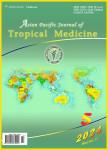Andrographolide inhibits chikungunya virus infection by up-regulating host innate immune pathways
Andrographolide inhibits chikungunya virus infection by up-regulating host innate immune pathways作者机构:Defence Institute of Physiology & Allied Sciences Defence Research and Development Establishment
出 版 物:《Asian Pacific Journal of Tropical Medicine》 (亚太热带医药杂志(英文版))
年 卷 期:2018年第11卷第3期
页 面:214-221页
核心收录:
学科分类:1008[医学-中药学(可授医学、理学学位)] 1006[医学-中西医结合] 100602[医学-中西医结合临床] 10[医学]
主 题:Chikungunya virus Andrographolide Interferon α Protein kinase R Retinoic acid inducible gene-I Tumor necrosis factor α
摘 要:Objective: To investigate the therapeutic efficacy of andrographolide, a plant derived compound, against chikungunya virus(CHIKV) infection. Methods: Using flow cytometry and immunoblotting assay, in vitro viral protein expression was studied in THP-1 cells line. In Balb/c mouse neonates, viral RNA copy number was determined by real time PCR. Results:The results showed reduced CHIKV protein expression on andrographolide treatment in CHIKV-infected human peripheral blood mononuclear cells, Vero cells and THP-I cell *** vivo, andrographolide treatment to CHIKV-infected neonates reduced viral RNA copy number. Further. andrographolide also increased cytotoxic T lymphocytes both in vitro and in vivo. Andrographolide also activated host innate immune pathways, viz., protein kinase *** eukaryotic initiation factor 2 α, retinoic acid inducible gene-Ⅰ and interferon regulatory factor 3/7, thereby increasing IFN-a secretion. CHIKV-induced nuclear factor κlight chain enhancer of activated B cells and tumor necrosis factor-a was also reduced on andrographolide treatment. Conclusion: Andrographolide inhibits CHIKV by suppressing viral protein expression and up-regulating host innate immunity and hence could be an effective therapeutic agent against CHIKV infection.



